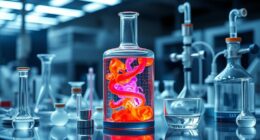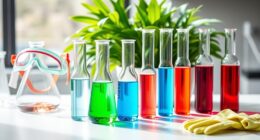To prepare for a chemistry lab practical exam, start by understanding the format, including station types, instructions, and grading criteria. Practice handling equipment like burettes and pipettes correctly, and review experiment procedures, safety rules, and common mistakes. Organize your data and notes, simulate the test conditions, and build confidence through mock exercises. Paying attention to safety and time management is essential. Keep this focus, and you’ll gain the skills needed to excel.
Key Takeaways
- Review all safety protocols, equipment handling procedures, and emergency procedures to ensure preparedness and confidence during the exam.
- Practice core experiment techniques, including titration, measurements, and data recording, under timed conditions to build efficiency.
- Familiarize yourself with the exam format, station instructions, and grading criteria to manage time and expectations effectively.
- Organize your lab notes, highlight common errors, and review calculations to identify areas needing improvement.
- Use simulation resources and virtual labs to reinforce skills, reduce anxiety, and ensure readiness for practical tasks.
Understand the Exam Format and Criteria

To succeed in your chemistry lab practical exam, you need to understand its format and grading criteria thoroughly. The exam usually features stations or tasks with specific instructions, so familiarize yourself with each type. The audit process can help identify potential gaps in your preparation by reviewing your understanding of key procedures and safety protocols. Time management is key—you must allocate enough time for every task, from setup to cleanup. During the exam, maintaining silence, following safety protocols, and working individually are emphasized. Your performance will be assessed on accuracy, precision, data recording, and adherence to procedures. Equipment setup and appearance also matter, so ensure everything looks correct. Paying attention to these criteria helps you focus on what’s most important, reducing mistakes and boosting confidence. Knowing the format allows you to plan your approach and stay organized throughout the exam. Additionally, understanding the importance of attention to detail can significantly improve your overall performance by helping you identify and correct errors promptly. Developing good lab safety practices will also contribute to smoother execution and reduce the risk of accidents during the practical.
Gather and Utilize Effective Study Materials

Gathering and utilizing effective study materials is essential for mastering your chemistry lab practical exam. First, familiarize yourself with essential lab equipment like beakers, burettes, and Erlenmeyer flasks. Know their specific uses and safety protocols for handling each item. Access online resources such as Quizlet for flashcards, YouTube videos for step-by-step procedures, and study guides on platforms like Studocu. These tools reinforce your understanding of equipment and safety rules. Create flashcards to memorize key terms and procedures, reviewing them regularly to improve recall. Organize your textbooks and notes from lab sessions, highlighting important concepts. Additionally, understanding the horsepower of electric dirt bikes can help you grasp the importance of precise measurements and performance metrics in lab experiments. Being familiar with various types of specialized laboratory equipment enables you to identify and use them correctly during the exam. Practicing with real laboratory setups can increase your confidence and ensure you’re prepared for the practical aspects of the exam. Incorporating up-to-date technological tools can further enhance your study efficiency and understanding. Developing a comprehensive practice routine that mimics actual testing conditions can further enhance your preparedness. Finally, join study groups to practice techniques and clarify doubts, ensuring you’re well-prepared to identify equipment and execute procedures confidently during the exam.
Organize and Review Past Experiments

Reviewing your past experiments systematically can substantially boost your readiness for the chemistry lab practical. Begin by organizing your lab notebook chronologically, noting experiment titles and dates to see your progression. Highlight corrections made during data collection to identify common errors. Incorporate vetted safety protocols to ensure adherence to best practices and prevent accidents during lab work. Color-code sections by experiment type, such as titration or calorimetry, for quick reference. Annotate procedural changes between initial and revised methods, and create cross-references for related experiments like Beer’s Law and concentration calculations. Break down core experiment components, mapping data collection points and isolating tested variables. Focus on error analysis techniques, such as applying Beer-Lambert Law to troubleshoot spectrophotometry errors or calculating percent error. Revisit critical calculations and visualize procedures with diagrams to reinforce your understanding and identify areas for improvement. Additionally, reviewing experimental variables can help you better understand how different factors influence outcomes and improve your troubleshooting skills. Recognizing the importance of climate control concepts such as temperature stability and environmental conditions can also aid in understanding how external factors affect experimental results. Incorporating reliable resources like textbooks or online tutorials can further enhance your preparation and confidence.
Develop a Focused and Efficient Study Plan

Creating a focused and efficient study plan is essential for maximizing your preparation time and performing well on the chemistry lab practical. Start by identifying key concepts like essential equations, chemical principles, and data analysis techniques you need to master. Louisiana Civil Code can offer insights into proper legal procedures, which can help you develop a structured approach to your study plan. Allocate specific time blocks for reviewing safety protocols and practicing basic calculations such as density and molarity. Familiarize yourself with the exam format, including question types and equipment used, so you can plan your study sessions accordingly. Recognizing common pitfalls, like frequent mistakes and time-wasting tasks, can help you avoid these during your review. Incorporate regular practice and simulation exercises to build confidence and efficiency. To enhance your understanding, consider exploring Hackathons in the USA, which often involve intensive problem-solving and collaborative skills that can translate to efficient lab work. Developing proficiency in testing tools such as lab measurement instruments and data recording devices can further improve your preparedness during the practical exam. Gaining an understanding of the neurological aspects of dreaming can also improve your ability to stay calm and focused under exam pressure. Using the Bike analogy, practicing gear shifts and understanding equipment setup can improve your adaptability and preparedness during the practical exam. Use available resources, such as lab manuals, online tutorials, and peer feedback, to strengthen weak areas and streamline your preparation efforts.
Practice Experiment Procedures and Apparatus Handling

Practicing experiment procedures and apparatus handling is essential for building confidence and ensuring accuracy during your lab practical. Rehearse key techniques like titration, pipetting, and mass measurement repeatedly to develop muscle memory.
Simulate timed conditions to improve your efficiency and accuracy under exam constraints. Practice assembling apparatus such as burettes and volumetric flasks independently, ensuring you understand each step.
Use proper labeling for data tables and equipment to prevent errors, and record data immediately with correct units and significant figures for precision.
Master critical apparatus handling by avoiding mouth pipetting, calibrating instruments beforehand, and practicing tare functions on balances. Reinforce proper burette readings and verify equipment cleanliness to ensure reliable results.
Additionally, understanding the proper handling of laboratory equipment can help prevent common mistakes and improve overall performance. Developing safe laboratory practices through consistent practice helps you perform smoothly and accurately during your practical exam.
Familiarity with emergency procedures in the laboratory can also enhance safety and preparedness during experiments, contributing to a confident and successful practical experience. Incorporating quality control measures into your practice routines can further enhance your readiness for the exam.
Identify and Avoid Common Mistakes

To succeed in your chemistry lab practical, you need to actively identify and prevent common mistakes that can compromise your results. First, pay close attention to significant figures and always include units in every calculation; neglecting either leads to errors or invalid results.
Be sure to double-check unit conversions, like grams to kilograms, to avoid mismatches. Document reactions clearly, including state symbols, and balance equations accurately to ensure correct stoichiometry.
Use properly calibrated instruments, and follow measurement techniques precisely to avoid errors like parallax or contamination. Always record data immediately and verify calculations, especially dilutions.
Finally, review your procedures to prevent skipped steps. Staying vigilant about these pitfalls keeps your results accurate and your confidence high during the exam.
Build Confidence Through Mock Practicals

Engaging in mock practicals is a proven way to boost your confidence before the actual chemistry lab exam. Virtual simulations like LabSims allow you to practice techniques safely and explore complex concepts, offering immediate feedback to correct errors in real time.
Repeating these simulations helps you master procedures and build familiarity, reducing anxiety during the real exam. Participating in pre-lab activities and case studies further prepares you by reinforcing key skills and boosting understanding.
Practice through virtual labs also enables you to compare techniques with peers and reflect on your performance, highlighting areas for improvement. By repeatedly practicing in a low-stakes environment, you develop the confidence needed to perform effectively and handle unexpected situations calmly during the actual practical exam.
Prepare Mentally and Review Safety Protocols

Preparing mentally for your chemistry lab practical involves thoroughly reviewing your course materials, especially experimental procedures and theoretical concepts, so you’re confident in your understanding.
Practice mindfulness techniques to reduce anxiety and sharpen focus during the exam.
Develop a time-management plan, allocating specific durations for each section.
Memorize key chemical formulas and conversions relevant to the scope of the practical.
To build confidence, simulate exam conditions by visualizing the lab setup and workflow.
Equally important is reviewing safety protocols.
Verify PPE requirements, locate emergency equipment, and rehearse spill response procedures.
Memorize chemical handling rules, emergency contacts, and evacuation routes.
Familiarize yourself with equipment, safety shutoffs, and regulations.
Being mentally prepared and safety-conscious ensures you approach your lab practical with confidence and readiness.
Frequently Asked Questions
How Can I Manage Exam Anxiety Effectively?
You want to manage exam anxiety effectively, so start by practicing deep breathing and muscle relaxation to calm your nerves.
Visualize positive outcomes and remind yourself of your preparation.
Engage in regular study routines and seek support from friends or family to boost your confidence.
What Should I Do if I Forget a Key Procedure?
If you forget a key procedure, don’t panic—your mind might feel like it’s drowning in a sea of confusion. Take a deep breath, and calmly review your lab notes or safety sheets.
Ask a peer or instructor quietly for guidance, and use available resources like manuals or digital videos.
How Do I Adapt to Unexpected Lab Equipment Issues?
When you face unexpected lab equipment issues, stay calm and follow a systematic approach. Check the equipment’s impact on your work, identify the problem’s root cause, and try simple fixes like recalibration or replacing consumables.
Communicate with your team, document your actions, and consider backup solutions. Always be prepared to adapt, troubleshoot step-by-step, and use available resources to keep your experiment on track.
What Strategies Help Improve Quick Decision-Making During the Exam?
To improve quick decision-making during your exam, focus on practicing regularly with lab equipment to build familiarity. Understand the principles behind each technique so you can adapt swiftly.
Manage your time effectively by simulating timed experiments, and review common errors to recognize issues early.
Collaborate with peers for diverse perspectives, and reflect on past mistakes to refine your strategies. This proactive approach boosts your confidence and decision-making speed under pressure.
How Can I Efficiently Review Complex Experiment Protocols?
Focusing on complex experiment protocols, you can break them into smaller, manageable segments, making each step easier to master. Instead of rote memorization, visualize procedures with flowcharts or diagrams to enhance recall. Cross-reference theories with steps to deepen understanding, and practice each part repeatedly to reinforce memory.
Annotate protocols with safety tips and common errors, then rehearse under timed conditions to build confidence and guarantee you’re ready for the exam.
Conclusion
Think of your exam prep as tending a garden. With careful planning, regular watering of your knowledge, and pruning away mistakes, you’ll see your confidence bloom. Practice like tending each plant, ensuring every experiment is healthy and strong. When exam day arrives, you’ll walk into the lab with the steady hands of a gardener, ready to harvest success. Keep nurturing your skills, and you’ll blossom into a chemistry expert.









